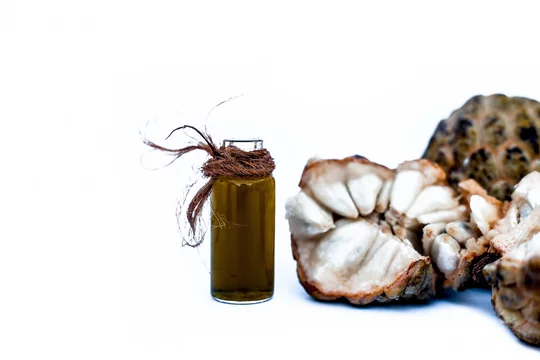|
User Role
|
Min/Max Order Quantity
|
|---|---|
|
Distributor
|
50-100
|
|
Retailer
|
100-150
|

Custard apple, also known as sugar-apple or sweetsop, belongs to the Annonaceae family and is native to the tropical regions of the Americas. It is widely cultivated in countries with warm climates, including India, Australia, and parts of Southeast Asia. The fruit is characterized by its knobby green exterior and creamy, sweet flesh speckled with dark seeds. Custard apple is prized for its unique flavor, which is often described as a blend of banana, pineapple, and vanilla.
Dehydration Process: Dehydrating custard apple involves removing most of its moisture content to create a chewy and concentrated snack. The process typically involves slicing the fruit thinly and then subjecting it to low heat or air drying until the desired texture is achieved. Dehydrating preserves the flavor and nutritional properties of the fruit while enhancing its shelf life.
Nutritional Benefits: Dehydrated custard apple retains many of the nutritional benefits of fresh fruit:
- Vitamins and Minerals: Custard apple is rich in vitamin C, an antioxidant that supports immune function and collagen production. It also contains vitamin B6, potassium, magnesium, and dietary fiber, which are important for overall health and well-being.
- Antioxidants: Custard apple contains various antioxidants, including vitamin C and polyphenols, which help protect cells from oxidative damage and reduce the risk of chronic diseases such as heart disease and cancer.
- Dietary Fiber: Dehydrated custard apple is a good source of dietary fiber, which aids digestion, promotes satiety, and helps regulate blood sugar levels.
- Long Shelf Life: Dehydrated custard apple has a longer shelf life compared to fresh fruit, making it suitable for storage and transportation. Properly stored in an airtight container, it can last for several months to a year.
- Portability: Dehydrated custard apple is lightweight and compact, making it an ideal snack for on-the-go consumption. It can easily be packed into lunch boxes, backpacks, or carried during travel or outdoor activities.
- Versatility in Culinary Uses: Dehydrated custard apple can be enjoyed in various ways. It can be eaten on its own as a chewy snack or used as an ingredient in recipes such as trail mixes, granola bars, baked goods, or desserts. It adds a naturally sweet and tropical flavor to dishes, enhancing their taste and nutritional value.

